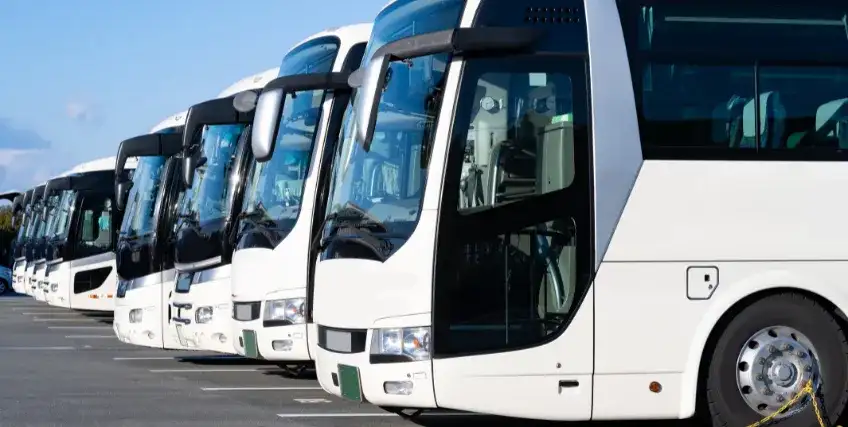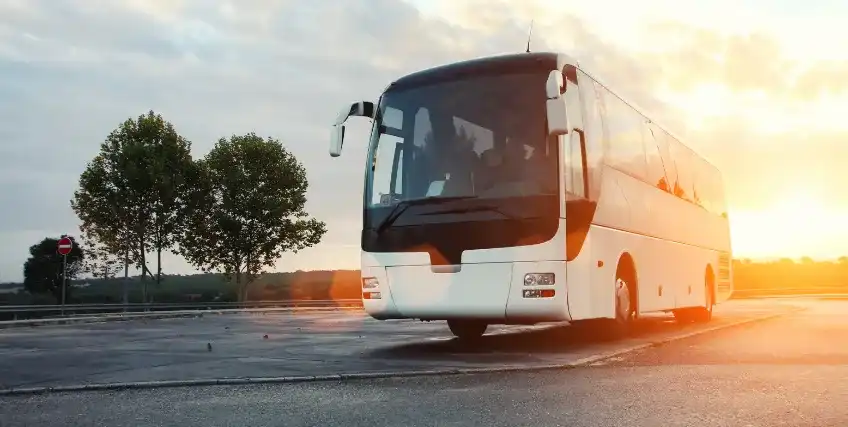Expand Your RV Business
With Motorcoach Financing
Looking for Business Financing?
Apply now for flexible business financing. Biz2Credit offers term loans, revenue-based financing, lines of credit, and commercial real estate loans to qualified businesses.
Set up a Biz2Credit account and apply for business financing
Thinking of growing your RV or motorcoach business? You’re not alone. Operators across the U.S. are seeing demand for spacious, road-ready rides that work as mobile homes, tour buses, and even remote offices. But buying these big machines takes big cash. That’s where motorcoach financing steps in.
From dealership owners to luxury charter companies, financing offers more than just a purchase tool. It unlocks growth. Whether you're expanding your fleet or upgrading a used RV, access to capital can be the difference between stalling and scaling.
According to the industry reports, over 600,240 new RVs were shipped in 2021 alone – a historic peak reflecting strong consumer and commercial interest source. But costs are no joke. The cost of a new Class A motorhome can start from $90,000. That’s a big number for a small outfit without external funding.
And with seasonal spikes, tight margins, and unpredictable expenses, having financing options is no longer a nice-to-have. It’s essential. So, what options are out there? And how do you know which one fits your business? Let’s dig deeper and break it all down.
The State of the RV and Motorcoach Business in the U.S.
If you’re in the RV or motorcoach business, the market's been interesting. Demand's growing, no doubt. But so are costs, delays, and competition. The good news? Americans are obsessed with the open road and that’s driving serious business for dealers, operators, and converters.
The RV Industry Association reports that over 8.1 million American households currently own an RV. Many use them for travel, but others rent them for events, tailgates, even mobile work setups. Businesses are catching on, offering niche services built around recreational vehicle use.
At the same time, new RVs aren't cheap. A Class A motorhome can cost upwards of $90,000. Used RVs? Still pricey, depending on condition and model year. You’ll often see RV loans and RV financing covering both.
Rental fleets and custom RV tour services are expanding fast. But adding one vehicle can feel like taking on a mortgage. That’s why many operators turn to motorcoach financing. It helps cover the upfront costs while keeping monthly payments manageable.
And let’s not ignore how interest rates play into this. A shift of even one percent can change your monthly payment by hundreds. Whether you're buying, refinancing, or just prepping for the season, understanding the lending landscape is key. Bottom line? Business is booming, but you’ll need capital to stay in the race. If you're not thinking about motorcoach financing, you might already be a lap behind.
Why U.S. RV Businesses Need Capital
Running an RV or motorcoach business isn’t cheap. Between maintenance, fuel, staff, and vehicle upgrades, costs add up real fast. That’s where motorcoach financing gives you breathing room.
1. Fleet Upgrades
Adding a newer model or replacing a worn-out unit? That’s a major out-of-pocket hit. Most Class A motorhomes don’t come cheap. A strong RV loan application lets you keep your cash in-hand while spreading the cost over manageable monthly payments. Whether you’re hauling passengers or converting for mobile business, newer RVs offer better mileage, fewer breakdowns, and longer life.
2. Repair and Maintenance
Even a used RV in decent shape needs constant care. Brake systems, generators, interior upgrades – it adds up. With motorcoach financing, you can tap into a line of credit or equipment loan to handle the unexpected. You avoid large cash burns and keep the business rolling without a hitch. This becomes even more useful during peak travel season when downtime means lost income.
3. Seasonal Cash Flow
Winter slump? Happens to most. If your revenue dips during off-months, financing helps smoothen your cash flow. Some use a short-term loan apply online process just to cover payroll or fuel. Others refinance older loans to free up cash. Either way, financing can be your off-season safety net.
Top Uses for Motorcoach Financing
Whether you're running a tour fleet or flipping vintage campers, you need more than horsepower – you need capital. Here’s how smart businesses are using motorcoach financing to keep their wheels in motion.
1. Inventory Purchase
Buying a fleet of travel trailers or a single Class A motorhome? Either way, that’s a chunk of change. RV financing helps cover the upfront cost, letting you pay over time. For dealerships, this means stocking high-demand models year-round. For tour businesses, it’s about having backup units ready to go – especially during peak travel months.
2. Business Expansion
Eyeing a second lot or launching a mobile office conversion business? Motorcoach financing makes it possible without draining your reserves. Expansion might mean buying land, adding vehicles, or hiring drivers. A well-structured loan term gives you room to grow without panicking over your cash position.
3. Custom Coach Builds
From mobile clinics to luxury entertainment rigs, custom builds cost more than standard models. Financing can fund the vehicle shell and interior customization – from leather seats to high-end tech. Think of it as an investment in niche services that charge premium rates.
4. Marketing & Staffing
Need to run a summer ad blitz or train your seasonal hires? Motorcoach financing doesn’t just fund vehicles. Working capital loans can help cover payroll, marketing campaigns, uniforms, or even fuel pre-purchases. When your reputation is built on experience, staffing and visibility matter just as much as horsepower.
Popular Motorcoach Financing Options
Not all loans are built the same. Your business size, credit profile, and growth plans decide what makes sense. Here are some popular ways to access motorcoach financing today.
1. Term Loans
Classic and straightforward. A motorcoach financing term loan offers a lump sum upfront, paid off over a fixed period. Great for purchasing new or used RVs outright. Repayment terms range up to 10 years depending on the loan amount, your credit score, and revenue. The best part? Predictable monthly payments that are easier to budget for.
2. Equipment Financing
Equipment loan uses your motorcoach or RV as collateral. It’s a popular route for business owners who want to avoid using their personal credit or home equity. You’ll typically need to submit a detailed RV loan application, including the make, model year, mileage, and purchase price. Most lenders offer competitive rates if the vehicle is new or nearly new.
3. Line of Credit
Need flexible cash? A business line of credit allows you to withdraw only what you need and pay interest on that portion. Handy during off-season lulls or unexpected repairs. Some lenders offer fast funding with a simple online loan apply processes. It's not ideal for buying a full RV but works well for operating costs or smaller upgrades.
4. Commercial Vehicle Loans
This one’s tailored to recreational vehicle loan needs. Designed specifically for buses, RVs, or Class A motorhomes, these loans consider vehicle specs and commercial use cases. Terms are often more favorable for businesses than for personal use RV loans. You may also find lower interest rates if your credit history is strong.
Pros and Cons of Motorcoach Financing
Like most things in business, motorcoach financing has its upsides and trade-offs. Before signing on the dotted line, it helps to know what you’re really getting into.
Pros of Motorcoach Financing
1. Preserves Working Capital
Instead of dropping $200K+ on a new rig, you can keep your cash for payroll, fuel, or emergencies. With RV loans and equipment financing, you only pay a monthly payment, freeing up funds for other parts of your business.
2. Builds Business Credit
On-time loan payments can improve your company’s credit profile. Over time, this boosts your chances of qualifying for better loan rates and flexible loan terms down the line. That’s something every operator should be thinking about.
3. May Offer Tax Benefits
Depending on how the loan is structured, you may be able to deduct interest or depreciate the vehicle. Always check with a tax pro, but smart use of motorcoach financing can give you more than just wheels. It may help you reduce your tax bill.
Cons of Motorcoach Financing
1. May Require Collateral
Some loans require a lien on your vehicle or another business asset. If you miss payments, the lender could repossess it. It’s not common with smaller loan amounts, but still a risk worth thinking about.
2. Affects Cash Flow
That monthly payment might look manageable, but it adds up. Especially during slow seasons. If your credit score isn’t great, you could face higher payments, straining your operating budget more than expected.
3. Not All RVs Qualify
Older models, converted trailers, or used campers may not meet lender criteria. Some only finance Class A or late-model units. That limits your options if you're into vintage or custom builds.
Who Typically Applies for Motorcoach Financing?
Not every borrower is the same. But when it comes to motorcoach financing, certain types of businesses show up time and time again. These three are usually first in line.
1. Tour Operators and Travel Businesses
From wine country to city sightseeing, travel-based operators rely heavily on top-quality RVs and coaches. Whether it's a full-blown Class A or a sleek fifth-wheel, these folks need to keep their rigs in top shape. With seasonal booms and dips, many of them apply online to secure funds fast. Good credit helps, but having stable bookings also boosts creditworthiness.
2. RV Dealerships and Resellers
Dealerships often juggle massive inventory costs. And since RVs don’t exactly fly off the lot year-round, they need flexible loan types to stay afloat. Whether it’s purchasing newer models or refinancing floorplans, motorcoach financing helps them maintain cash flow while staying fully stocked. A clean credit history can lower loan rates significantly.
3. Custom Builders and Specialty Converters
These businesses turn recreational vehicles into food trucks, mobile clinics, and artist studios. Their costs go way beyond just buying a unit. It’s the customization that really adds up. A detailed RV loan application with plans and cost estimates often helps in securing funding. They're creative, sure, but they're also savvy borrowers.
Preparing for a Motorcoach Financing Application
Getting approved for motorcoach financing takes more than just wanting new wheels. Lenders want proof you can repay, and your paperwork better be on point. Start by checking your credit score. It's a deal-breaker for most. Anything above 680 puts you in better shape for credit approval and lower interest rates.
Next, pull together all financial statements. This includes profit and loss, tax returns, and cash flow reports from the past year or two. The stronger your business revenue, the more favorable your loan amount or loan term could be.
Don’t forget vehicle details. If you’re applying for a recreational vehicle loan, have the model year, mileage, and VIN ready. Custom builds may need a formal quote or invoice. Lenders want specifics, not guesses.
A well-prepped RV loan application speeds things up and can help avoid unnecessary delays. Whether you’re applying through a local credit union, federal credit union, or commercial lender, organization matters.
Bottom line: Treat your loan application like an audition. Be clear, complete, and ready to show that your business isn’t just roadworthy, it’s creditworthy.
Trusted by Thousands of Small Business Owners in America.**
Simply because we get what you go through to build a business you believe in.
**Disclaimer: All stories are real, as told by real business owners. Customers do not receive monetary compensation for telling their stories.
From One Entrepreneur to Another: We Get You
We understand what's behind building a business you believe in.
All stories are real, as told by real business owners. Customers do not receive monetary compensation for telling their stories.



Articles on Motorcoach Financing
A Guide to Motor Coach Loans: Everything You Need to Know to Finance Your Fleet
No matter how successful your business is, buying a motor coach is a big investment. Charter bus companies, tour operators, and shuttle services all rely on financing to grow their fleets.
Motorcoach Financing: How to Choose Loan or Lease for Your Business
You help others stay on the move. As a transportation business or motorcoach operator, you play an important and necessary role. But the fact is, running your business...
Motorcoach Financing vs Leasing: Which Is Right for Your Fleet?
If you own a transit business or any other business that requires motorcoaches, vans, or even motor homes, you’ve probably debated whether motorcoach financing vs leasing...
Frequently Asked Questions About Motorcoach Financing
1. What exactly is motorcoach financing?
Motorcoach financing is business funding used to buy, lease, or upgrade commercial RVs or motorhomes. It’s designed for companies, not individual travelers. Most plans include fixed loan terms, regular monthly payments, and options based on credit score, income, and vehicle type.
2. Can I use RV loans for used vehicles?
Yes, many lenders offer RV loans for pre-owned Class A or B vehicles, especially if the model year is recent and mileage is reasonable. Rates can vary based on the RV’s age, your credit history, and the loan amount. Be ready to show maintenance records or resale value during the loan application process.
3. What documents do I need for an RV loan application?
At minimum, bring your business license, tax ID, recent bank statements, and financials like profit-and-loss or cash flow. If the vehicle’s already selected, include the VIN, mileage, and specs. The more complete your RV loan application, the quicker the credit approval.
4. Can I apply online for motorcoach financing?
Many lenders now offer quick loan apply online processes. Just upload your documents, fill out a basic loan application, and wait for approval. Some even offer same-day approvals for qualified borrowers. Just make sure the site is secure and FDIC or NMLS registered.
5. Is refinancing available for older RV loans?
Refinancing is common. If you’re stuck with high interest or need better cash flow, you can refinance your recreational vehicle loan. It may lower your monthly payment, extend the term, or free up cash for other business needs.
Frequent searches leading to this page
Term Loans are made by Itria Ventures LLC or Cross River Bank, Member FDIC. This is not a deposit product. California residents: Itria Ventures LLC is licensed by the Department of Financial Protection and Innovation. Loans are made or arranged pursuant to California Financing Law License # 60DBO-35839



